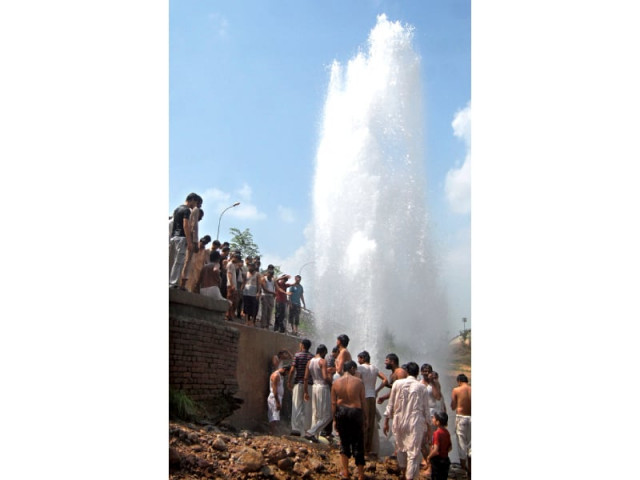After power plan, CDA turns to water conservation
Authority hopes to repair damaged lines and create awareness on better usage.

Hot on the heels of a new energy conservation plan, the Capital Development Authority (CDA) has come up with a campaign for water conservation in the federal capital.
In a meeting on Friday, the civic agency decided to combat the water shortage in the city by using a strategy that includes effective monitoring of leakages in the city’s water supply, imposition fines for water wastage, and raising awareness among residents on how to save water.
The meeting was chaired by CDA Environment Member Kazim Niaz, who has been appointed the focal person for water conservation efforts by CDA Chairman Tahir Shahbaz.
Niaz said that Islamabad is already facing water shortages and “this precious resource cannot be allowed to go to waste”.
Over the phone, CDA Spokesperson Ramzan Sajid said the water wastage in the city is thrice what is considered acceptable.
“Water wastage in the city stands at around 40% to 50%,” he said. “We are trying to bring it down to 10% to 15%, which is acceptable for a municipality.”
He said rusty water pipelines, disruptions in water distribution and supply due to load shedding, illegal connections and water wastage in residential areas all contribute to the shortage of water.
Sajid said CDA Water Supply Director Zulfiqar Jadoon informed the meeting that his staff found and fixed 23 water leaks around the city during the last few days.
As part of the new plan, inspectors from the water supply directorate will visit different areas of Islamabad to check and impose fines for water wastage in residential and commercial areas, Sajid said.
The CDA is also seeking the support of residents to curb wastage of water. The civic agency will also launch an awareness campaign to sensitise the public about saving water.
CDA Chairman Tahir Shahbaz had earlier said that collective efforts are needed to transform Islamabad into a model city for water and energy conservation.
Sajid said CDA Environment officers will visit schools to spread the water conservation message among children. In addition, public service announcements and educational material will be issued.
Enforcement of energy plan begins
Meanwhile, the CDA has started enforcement of the energy conservation measures it adopted on Tuesday. The electrical wing of the civic agency has begun disconnecting alternate street lights in sectors I-8 and G-7, and will move on to other sectors soon, Sajid said.
He said the directorate of parks has been ordered to close Fatima Jinnah and Rawal Lake parks by 9pm and only leave on lights that are necessary for the security staff to work.
Khali Sufi, a senior member of the Islamabad Citizens Committee, said in addition to cutting electricity consumption, the public and the city government should also think about alternative sources of energy.
“We should move towards using solar energy, at least for lights and fans in our homes,” Sufi said.
Islamabad’s power supply issues also came up in National Assembly during the question hour on Monday when Pakistan Muslim League-Nawaz Member National Assembly (MNA) Shaheen Ishfaq inquired about the CDA’s plans for a 100 megawatt (MW) power plant.
Makhdoom Shahabuddin, federal minister for textile industry, replied to the question and said that CDA filed an expression of interest earlier in 2012 for consultancy services for the feasibility studies, design preparation and construction supervision of two 100 MW coal-fired power projects in Islamabad. He said the project is still in the feasibility study phase and that the timeline and cost of the project will be ascertained after the feasibility is completed.
Published in The Express Tribune, October 20th, 2012.



















COMMENTS
Comments are moderated and generally will be posted if they are on-topic and not abusive.
For more information, please see our Comments FAQ